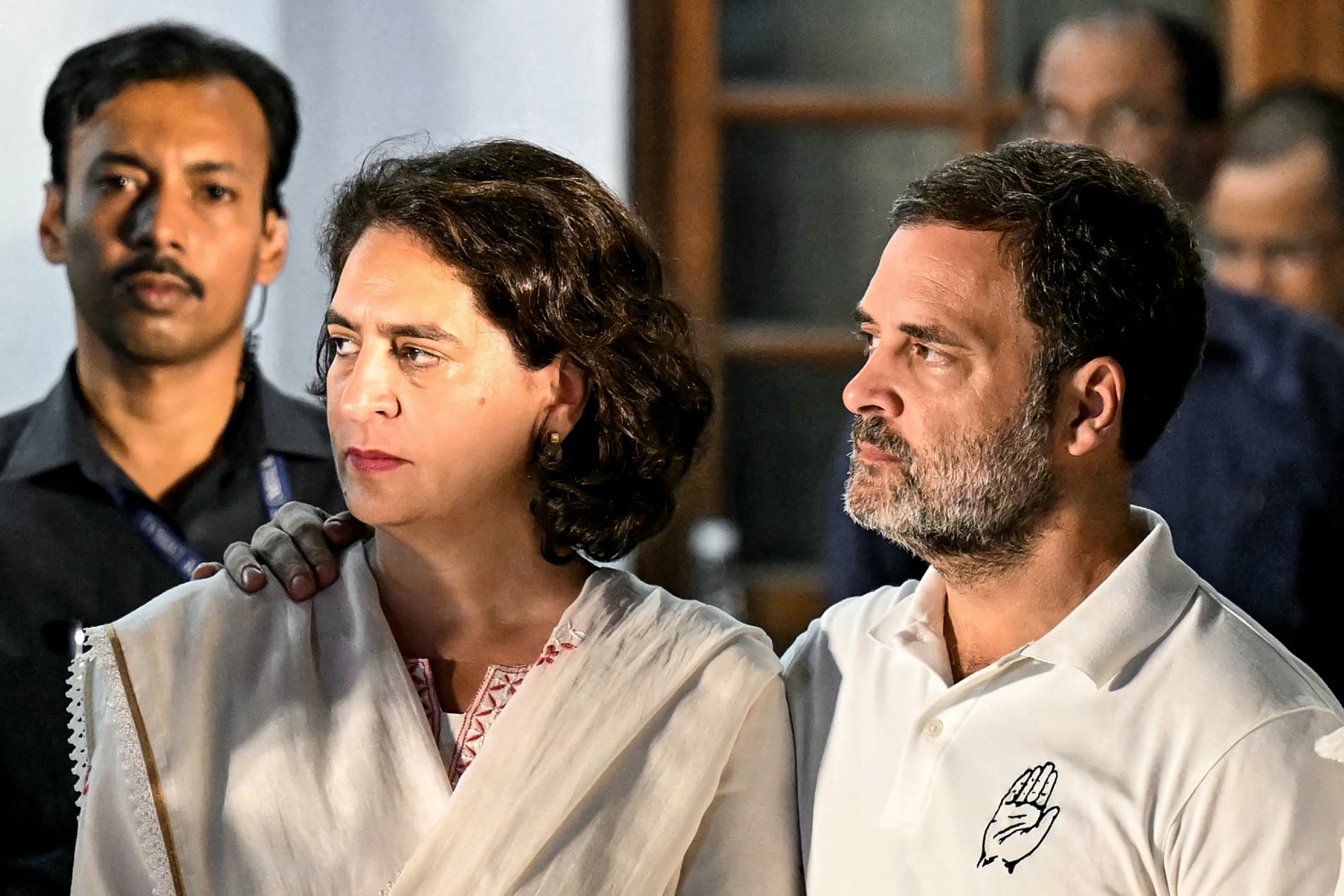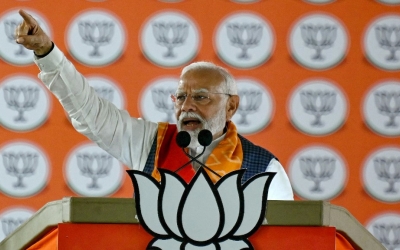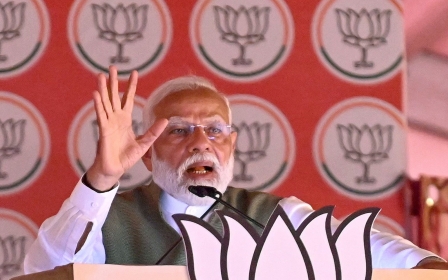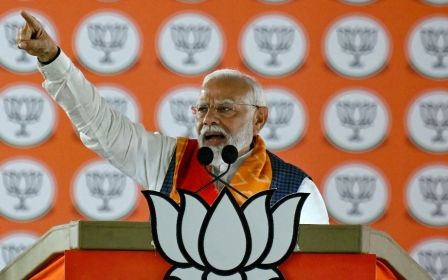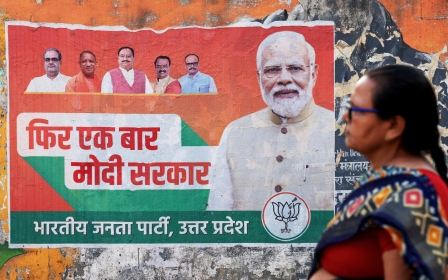India elections: Modi returns to power with clipped wings
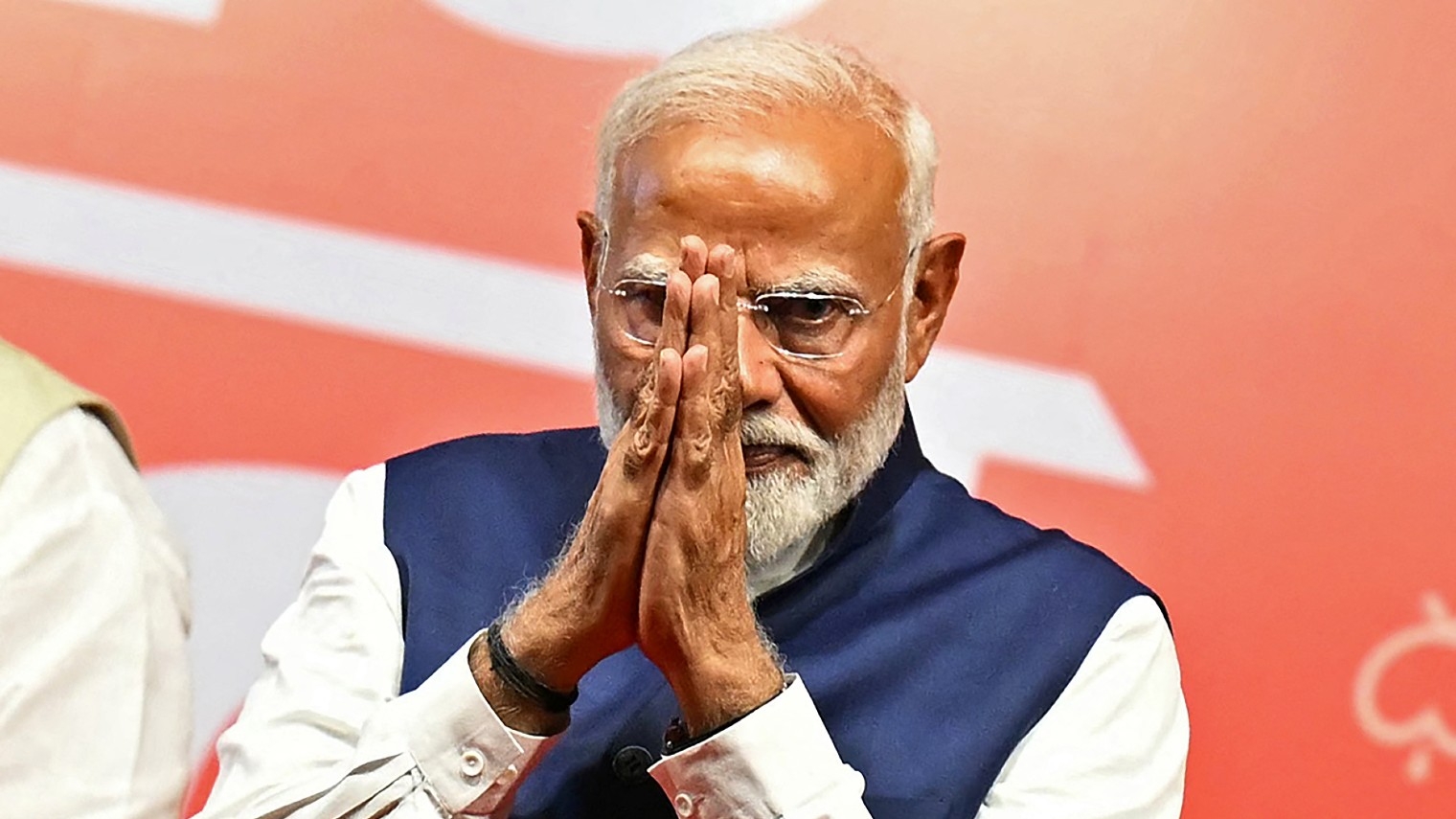
In a dramatic scene right out of a Bollywood movie, Indian voters have shredded Prime Minister Narendra Modi's plans for a supermajority in the Indian Parliament as his ruling Bharatiya Janata Party (BJP) secured a third term but with a weakened mandate.
It was nothing short of a "karmic" end to India's highly polarised parliamentary elections, which saw Modi, 73, proclaim himself as someone divine, who is "not biological" but "sent by God" to lead the country.
Modi's immortal aura as an invincible political strongman is now in tatters, effectively weakening his stature within the Hindutva party.
The electoral setback for Modi, who has dominated Indian politics for over a decade with his communally divisive anti-Muslim rhetoric, also comes against the backdrop of murmurs of his plan to push through the constitutional changes he yearns for to create a presidential system that would grant him and his Hindu right-wing party greater powers.
The opposition pitched the elections as a battle to save the constitution.
New MEE newsletter: Jerusalem Dispatch
Sign up to get the latest insights and analysis on Israel-Palestine, alongside Turkey Unpacked and other MEE newsletters
The Modi brand has also taken a hit, given that the incumbent BJP leader entered the electoral fray with its slogans of "Abki Baar 400 paar" (will cross 400 this time) and "Modi's guarantee", a reference to different welfare schemes he had delivered.
'Burst bubble'
Indian political scientist Pratap Bhanu Mehta contends that the result bursts Modi's authority bubble, given that he made this election about his performance, omnipotence, omniscience, and ideological obsessions.
"Modi is, for the moment, not the indomitable vehicle for history or the deified personification of the people. Today, he is just another politician, cut to size by the people," he said.
Modi's immortal aura as an invincible political strongman is now in tatters, effectively weakening his stature within the Hindutva party
Nearly 643 million people - among almost a billion eligible voters - headed to the polls over the course of India's seven-phase election - which was marked by a bitter campaign that played out along religious and sectarian lines.
The voting was held during a scorching heat wave that has been blamed for the deaths of about 80 people across the country, including at least 10 polling officials.
In the results announced on 4 June, Modi's ruling BJP secured 240 of the 543 seats in the Lok Sabha, the lower house of the Indian Parliament. This fell short of the 272-seat majority required to form a government independently.
In 2019, the BJP had a clear majority with 303 seats.
With the support of its allies, the BJP-led National Democratic Alliance (NDA) coalition, which amassed 293 seats, is poised to form the new government.
Modi's political fate now remains in the hands of his two key partners: the Nitish Kumar-led Janata Dal (United) in North India's Bihar state and the Chandrababu Naidu-led Telugu Desam Party (TDP) of Andra Pradesh in South India.
While JDU bagged 12 seats, and TDP won 16 parliamentary seats. The two regional parties will now be on equal footing with the BJP in terms of power. Other allies will also seek a major role in the government.
The principal opposition Congress party, spearhead of the INDIA bloc, secured 99 seats, improving its 2019 tally of 53 seats. The INDIA bloc coalition secured 234 seats in total, with the Samajwadi party securing 37 seats, the All India Trinamool Congress (AITC) in Bengal 29, while the southern Dravida Munnetra Kazhagam (DMK) got 22 seats.
The opposition alliance performed better than many political analysts and pollsters had predicted.
Campaigning under considerable duress, it faced an unprecedented threat of raids and arrests by agencies such as the Enforcement Directorate (ED) and the Central Bureau of Investigation (CBI), which the Modi government often weaponised to target its detractors and critics.
Indian opposition leader Rahul Gandhi thanked the voters for
"[resisting] the onslaught on this constitution". The former National Congress Party leader added: "We and the INDIA bloc didn't just fight a political party. We were fighting the entire structure of governance, like the Intelligence Bureau, CBI, ED, and the section of the judiciary that has been captured and threatened by Mr Modi and Mr Shah."
As electioneering intensified, two chief ministers were arrested, the Congress party's bank accounts were temporarily frozen, and the party faced significant tax penalties.
Other political formations, such as the Shiv Sena and the Nationalist Congress Party (NCP) were fragmented, and legal verdicts appeared manipulated in what were perceived to be aggressive tactics.
Falling short
Modi's hopes of returning to power with a bigger mandate and reigning with a sense of invincibility were rooted in his success in the Hindi heartland, where the party traditionally does well.
The BJP's seat share, however, fell significantly short of both the predictions made by exit polls and the 400-seat target set by Modi before the voting began. The results are particularly significant due to the noticeable loss of support for the BJP in its traditional strongholds across India, especially in the bellwether state of Uttar Pradesh and the financial hub of Maharashtra.
In northern Uttar Pradesh, which is ruled by the BJP and witnessed large-scale state violence against Muslims, the NDA dropped down to 36 out of 80 seats in 2024 (against 62 in 2019), while the opposition INDIA alliance secured 43 seats. Likewise, in Maharashtra, the NDA only secured 17 of the 48 seats, while the INDIA bloc secured 30 seats.
In the 2024 polls, the BJP's vote share in the northern Hindi-speaking region saw a marginal dip of 2.3 percent to 48.9 percent. However, the opposition significantly improved its share by 11.2 percent and secured a 41 percent vote share.
The BJP's vote share also fell considerably in the western part of the country, where it lost 14.1 percent to secure 50.4 percent of the votes.
Moreover, while the BJP's urban-centric, middle class and upper-caste vote share remained largely intact, securing 47 seats in 2024 against 50 seats in 2019 from urban sectors, in rural areas it won only 193 seats in 2024 against 253 seats in 2019.
The opposition INDIA bloc significantly gained in semi-rural and rural areas and received considerable votes from Muslims, Scheduled Caste (SC), and Scheduled tribes (ST) communities.
'Brutal repression'
Modi, who has served as premier since 2014, is lauded by his Hindu right-wing supporters as a transformative figure who modernised the country and turned India into a global power.
However, detractors have characterised his decade-long rule as turning India into an illiberal democracy and towards authoritarianism, while overseeing high inflation and stagnating living standards for poorer Indians.
It has been marked by brutal repression of political opponents and dissenters, violence by militant Hindu nationalist vigilante groups against Muslims and oppressed castes, and a rise in communal rhetoric and Islamophobia.
During India's multiphase national elections, the BJP campaign adopted an increasingly vitriolic tone towards Muslims
His rule has witnessed major legislation pushed through by executive processes, including the abrogation of Article 370 in Jammu and Kashmir and the anti-Muslim Citizenship Amendment Act of 2019, that pander to his core Hindutva voter base.
During and in the run-up to India's multiphase national elections, the BJP campaign adopted an increasingly vitriolic tone towards Muslims.
To consolidate the Hindu voter base, BJP leaders resorted to speeches laden with hate, dog whistles, Islamophobic tropes, and communally charged rhetoric.
Modi himself made a series of anti-Muslim statements, referring to Muslims as "infiltrators" and characterising them as "those who have more children".
Denying a majority
The results, however, reflect a growing dismay over the "cult" of Modi. The BJP lost the key constituency of Faizabad, which houses the newly inaugurated Ram Mandir temple in Ayodhya, one of the biggest ideological promises in the BJP manifesto.
As The Guardian succinctly underscored: "The frustrations that led to the BJP losing the Faizabad seat are ones reflected across the state: religious polarisation and pride in the Ram Temple ultimately did not trump anger at rampant unemployment, stagnant wages, and unaffordable inflation."
According to an analysis of poll results by digital publication The Quint, the BJP or NDA candidates lost in nearly half the seats where Modi gave speeches as part of the campaign.
"By denying a majority to the BJP, voters have clearly signalled that Modi's magic has worn off," wrote journalist Andy Mukherjee, adding: "His fading halo can no longer keep people distracted from everyday issues such as high unemployment in cities and depressed incomes in villages."
Modi's political maverick persona has arguably been dented by the protracted farmers' protest, which saw different landholding castes, like Jats, landless agricultural labourers including Dalits and Muslims, and other agrarian intermediaries, come together against the BJP government.
Most critically, however, it is the consolidation of the Muslim voters, who have been facing the institutional violence of the Indian state and from the emboldened Hindutva far right, that have helped the INDIA bloc in several key constituencies.
The views expressed in this article belong to the author and do not necessarily reflect the editorial policy of Middle East Eye.
Middle East Eye delivers independent and unrivalled coverage and analysis of the Middle East, North Africa and beyond. To learn more about republishing this content and the associated fees, please fill out this form. More about MEE can be found here.



